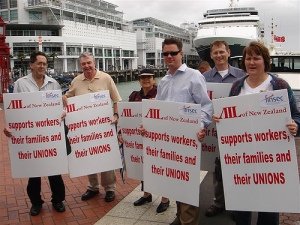 Photo by finsec
Photo by finsec
A short caveat: while this post is not totally unrelated to my regular line of writing, it does somewhat detaches from my usual subject matter and is focused more on personal doubts, questions and thoughts and less on practical implications.
I see myself a capitalist. I believe in its basic premises. And while my views have become less extreme in the last few years and I do think there is a need to rethink and change some of the basic practical behaviors we derive from the concept, it is still a part of how I define my world views.
Within this framework I have always wondered about the idea of work unions. On a very shallow level it seems incompatible with the some of the ideas I used to think capitalism represented, so in my younger years I immediately thought of unions as something wrong. However, over the years I understood the importance of mechanisms that will put some balance into the capitalist system so it will not undo itself. Having said that, maybe because of my biased viewpoint, wherever I looked I saw unions resisting change and progress, upholding stupid rules (see this Gates talk on TED for some examples) and keeping the interests of the top quartile of employees instead of those who actually need protection. This has always bothered me.
Lately, because of current political and economic issues in Israel, I have been thinking about this issue quite a bit. This week, while listening to a freakeconomics podcast about the negotiations between the NFL league and the players union (negotiations, many of the players themselves are not privy to) I came to a realization that what troubles me about unions is something that has been troubling me about other fields as well. The misuse of the idea of equality. I have written before (see also here):
Equality is an important concept in many aspects of life, especially in the legal field, I know so well, as a former lawyer. But in real life, because equality is intertwined into our thinking DNA it is used in ways that many times hinders excellence. All men are not born equal. Whoever tells you that is lying. All man should deserve an equal opportunity to excel, to be happy and to use their comparative advantage. That is the truth. And there is a big difference between the two.
…
In western societies, equality is part of the ethos. People fought for the right of equality for ages and it is so commonplace and understood (even if not completely practiced) we regard it as a given right. The quotation “All men are created equal” is arguably the best-known phrase in any of America’s political documents. And if all men are created equal, they should be treated as equal in the workplace as well. And they think as themselves as equal. And this creates problems. Because we are not equal. We are unique. Special. With different talents, skills, perspectives, life experiences, likes and dislikes. And that means that treating us as if we are the same is wrong.
In the case of unions, the idea of equality means that unions can act like all workers are equal. If they are equal, they can talk about the average worker. It is a classic case of the fallacy of the average. Because of everybody is equal and we are taking care of the average worker we are losing the individuality. And that is the fastest way to mediocrity.
In Practical Wisdom: The Right Way to Do the Right Thing, Barry Schwartz and Kenneth Sharpe write:
That’s what Aristotle meant when he said that practical wisdom as opposed to a universal rule was necessary because of the priority of the particular. A wise person knows how to do the right thing, in the right way, with this person, in this situation. To be wise, we need cognitive and perceptual machinery that picks up on similarities without being blind to differences.
I am not an expert on the issue of unions, their history and their contribution to society. I am also not against the idea that workers should be protected to some degree and have a right to be represented. I do resent the fact that some unions focus their attention on keeping the status quo and base their thinking on a misconception of equality that leads to a discussion of averages. In general, the work of any leader, political, business, union or other, is to balance similarities and differences. I am not sure that many of the union leaders or those that sit with them to the table of negotiations are actively thinking of this balance. What will happen if both sides of a labor dispute (or even better, prior to the dispute) will start doing just that? Isn’t it worth a try?
Elad
